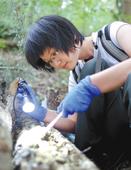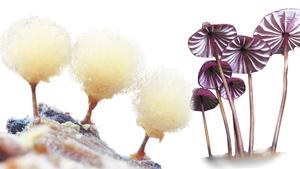Fungus specialist attracts legions of online fans as she shines a light on life in the dark, Li Yingxue reports.
 Drug developer Zhou Qingfeng examines mold on a rotten tree trunk in the mountains near Shanghai. (PHOTO PROVIDED TO CHINA DAILY)
Drug developer Zhou Qingfeng examines mold on a rotten tree trunk in the mountains near Shanghai. (PHOTO PROVIDED TO CHINA DAILY)
Slime. Mold. To most people, it is disgusting. Something to be avoided. Zhou Qingfeng is not most people. She looks at the constituent parts of slime and mold, what the uninitiated often refer to as fungus, and sees something beautiful, artistic, with pretty eye-catching shapes.
"Fungi are not difficult to find, as you can find them in the fallen leaves and rotten wood in your backyard," says Zhou.
The 30-year-old, who is known as Yeweijun on microblogging platform Sina Weibo and has more than 840,000 followers, shares her videos of fungi and answers questions from members of the public.
Slime molds are Zhou's current favorites as they are pretty, come in different shapes and grow rapidly. "Sphaerobolus, also known as cannonball fungus, looks like salted egg yolks, and pilobolus looks crystal clear even though it grows on cow dung," Zhou explains.
Zhou is a drug developer in Shanghai. She chose to live in a suburban area so that her home has enough space for her to keep a dedicated room for a greenhouse to cultivate her fungi. Her home is not near the office and her daily commute takes three hours.
The room, just 6 square meters, has an air conditioner, a humidifier and an incubator for her work. There is also a microscope stationed in the room.
Each day she checks on her fungi four to five times to see which are ready to be photographed or filmed as part of a time lapse to record their growth.
"Each time when I have to leave home, I worry most about my fungi," she says.
During the novel coronavirus outbreak, Zhou realized that much of her work can be done at home, so she decided to take up part-time employment to have more time with her fungi.
With more income coming in from her photos and videos, as well as income she earned through her science popularization work about fungus, Zhou says she hopes she can quit her job completely and focus on nothing but fungi.
Zhou admits that taking photo records of her work and the growth of the fungi can be nerve-wracking.
"I'm always nervous each time I photograph or video my specimens, but it makes me feel full of vitality," she says. "I need to continuously explore how to record the fungi, capturing their best state at the right time. Meanwhile, for most of the specimens, I don't always know before recording, for instance, about its exact type, its final shape and how long it will take for the camera work."
 The video and photo she takes and posts on social media recording the evolving stages of all kinds of molds have won over her many followers. (PHOTO PROVIDED TO CHINA DAILY)
The video and photo she takes and posts on social media recording the evolving stages of all kinds of molds have won over her many followers. (PHOTO PROVIDED TO CHINA DAILY)
A collective interest
Plans can change quickly when she is working.
There was one time, for example, that Zhou planned to photograph one type of fungus, but she suddenly noticed something new next to it. She dropped the original plan and changed tack, shifting her focus onto the unknown growth. She felt as if she was exploring a new land, which in a way she was.
"That fungus grew so fast that I stayed up all night to record its evolving stages, as I had to change my focus as it grew," she recalls.
It's not easy to find the right fungi to cultivate, and the hardest thing is to have a fungus that is in its prime. To find the best young fungus, Zhou would often explore in the mountains.
Rotten wood is a favorite hunting ground as it provides the perfect breeding conditions for fungi. She will often return home with bags full of rotten wood.
This treasure trove of mulch, of course, comes with things other than fungi, such as creepy-crawlies, like bugs, centipedes and cockroaches. "One night I woke up to find a centipede on my quilt and I was terrified," Zhou recalls.
The bugs also bring Zhou another problem-they eat the fungi. Once she spots a bug climbing onto her fungus, she will pick it up with a pair of tweezers and move it away gently, without destroying the fungus.
As well as going to the mountains around Shanghai, Zhou also visits other places, such as Southwest China's Yunnan province during the hot summer months to find and photograph fungi.
As she continues to rack up fans and followers online, Zhou doesn't have to go out to find rotten wood that often. She actually receives it-and sometimes even cow dungin the mail from her followers all across the country.
"It's interesting that once some fans see a piece of bark on the street, they may think I need it, and pick it up and send to me," Zhou says with a smile.
Zhou majored in pharmacy at Central South University and graduated in 2013. "I had thought my interest was in traditional Chinese medicine, but during college I realized that my real interest was to observe nature, plants and animals," Zhou says.
She started to post her photos of various creatures in 2012, but she got bored of watching animals and plants in the city. When she noticed fungi, her attention was grabbed as if by some powerful force.
"I like pretty things. For fungi, I'm always looking for and shooting the pretty species," she says.
Since 2017 she has posted more than 60 videos, gathering more than 1 million fans on all online platforms, such as Sina Weibo and video-sharing platform Bilibili.
For her, all knowledge about fungus has to be self-learned. She read English essays and books to study how to cultivate different fungi.
Some of her fans also want to cultivate fungi like Zhou.
So, Zhou figured out a way to cultivate slime mold and makes a product that everyone can use to cultivate by themselves following her detailed instructions.
The product has been ordered more than 200 times each month on e-commerce platform Taobao. According to Zhou, some use it for experiments, some for art design and some even take it as a type of "pet".
"Many of the customers are students or parents, and the slime mold can continue to multiply so that one student can share with his or her whole class to observe and play with it, which may attract more fans," she says.
Zhou was often asked whether she felt lonely recording fungi. "That is a simple question to answer: I don't feel lonely at all. It's my hobby, and it's fun," she says. "It is like an exploration of the boundaries of knowledge."
Contact the writer at liyingxue@chinadaily.com.cn


